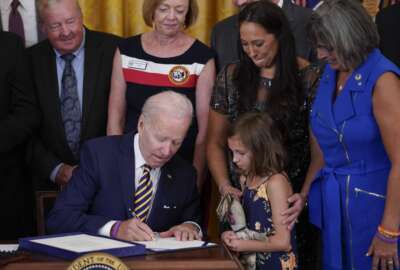DOJ finds VA employees can’t be sued by states for providing agency-approved abortions
The Justice Department is telling the Department of Veterans Affairs that state government officials cannot pursue criminal or civil charges against its employees...
The Justice Department is telling the Department of Veterans Affairs that state government officials cannot pursue criminal or civil charges against its employees for performing abortions, as they’re now authorized to do in limited, life-threatening situations.
VA Secretary Denis McDonough told members of the Senate VA Committee on Wednesday that the DOJ’s Office of Legal Counsel issued a legal opinion, just hours before his testimony, that found VA’s interim final rule (IFR) on providing its patients with access to reproductive health services “is a lawful exercise of VA’s authority.”
“The OLC opinion further concludes that states may not impose criminal or civil liability on VA employees, including doctors, nurses administrative staff, who provide or facilitate abortions or related services in a manner authorized by federal law including the IFR,” McDonough told the committee.
The DOJ opinion, McDonough added, found state officials, under its interpretation of the U.S. Constitution, cannot penalize VA employees “performing their federal functions, whether through criminal prosecution, license revocation proceedings, or civil litigation.”
“I think this OLC opinion makes very clear the protections that are afforded VA providers,” McDonough said.
The DOJ Office of Legal Counsel didn’t immediately respond to a request for comment on Thursday about its legal opinion on the VA interim final rule.
The DOJ legal opinion provides additional legal protection for VA employees, after the VA announced on Sept. 2 that a recent Supreme Court decision striking down Roe v. Wade necessitated the VA’s action to provide abortions and abortion counseling.
The VA interim final rule also outlines legal protections for agency employees who provide abortions under a limited set of life-saving circumstances, including in states where those abortions are illegal.
Sen. Mazie Hirono (D-Hawaii) told McDonough that the DOJ legal opinion provides clarity for VA employees, adding that the Supreme Court’s decisions and subsequent state restrictions have “created a lot of fear among doctors and the professionals, doctors, nurses and others as to what kind of reproductive services they can provide.”
Hirono pointed to statements from several state attorneys general indicating that they will prosecute any provider that provides abortion services in their state.
“It is really important that as far as the VA is concerned, in terms of their legal posture, that they are able to provide these kinds of services without being dragged into court by state attorneys general,” Hirono said.
McDonough said the VA, more than two weeks from issuing its interim final rule, has performed one abortion.
The agency, he added, provides health care to 300,000 women veterans of childbearing age every year.
“My hope is that no one would ever have to face the health or life-threatening, let alone rape or incest results, to have the service, but because of the importance of ensuring the health and safety of those veteran patients, we have determined that we needed to do this,” McDonough said.
The interim final rule only allows the VA to provide abortion counseling or abortion services in cases of rape, incest, or situations that endanger the life or health of a veteran. “As it relates to the health of the veteran, that will be determined in consultation with the veteran’s healthcare provider,” McDonough said.
Sen. Jerry Moran (R-Kan.) said he was “strongly opposed” to VA’s interim final rule that permits employees to provide abortion services to veterans and their dependents in every state, “even in those states who have prohibited abortion.”
McDonough said the VA is currently determining whether it has adequate training and equipment to provide abortion services to its patients nationwide.
“We’re going through those training steps now and making sure that obviously, these are all things that we could not do prior to the interim final rule because it’s prohibited. So we’re going through those steps now,” he said.
The VA’s updated abortion policy puts its health care more in line with the benefits provided by the Defense Department in delivering what are deemed “covered” abortions. Those abortions, in cases of medical necessity, rape or incest, are legal under the Hyde Amendment, which bans the use of federal funds for abortions.
In late July, Sens. Elizabeth Warren (D-Mass.), Chris Van Hollen (D-Md.) Hirono and 22 other senators wrote a letter to McDonough urging the VA to start providing abortions.
However, House VA Committee Ranking Member Mike Bost (R-Ill.), House Appropriations Ranking Member Kay Granger (R-Texas) and House Budget Committee Ranking Member Jason Smith (R-Mo.) wrote a letter to McDonough this month saying the VA is prohibited under the 1992 Veterans Health Care Act from providing abortions.
The Republican lawmakers also point to another recent Supreme Court ruling, West Virginia v. EPA, which limits the scope of certain federal agency rulemaking.
“Given this administration’s track record and your recent efforts to provide abortion through the
VA health care system via rulemaking, despite a clear legal prohibition against doing so, we are
compelled to underscore adherence to West Virginia v. EPA and remind you of the limitations of
your authority,” the lawmakers wrote.
While VA’s new authority to provide abortions dominated much of Wednesday’s questioning, the committee held its hearing to examine veterans’ access to timely care within the VA medical system.
A RAND Corporation report presented to the committee found that more than 3 million veterans have received non-VA care through the agency’s VA Community Care program since 2014. The VA meanwhile, estimates that 44% of all care available from both VA facilities and VA Community Care is now provided by non-VA providers.
“We must focus on strengthening VA and attracting medical and administrative personnel, especially to rural parts of the U.S. to care for our veterans,” Brown said.
The recently passed PACT Act gives the VA tools to bolster its workforce. Among its provisions, the legislation requires the VA to create a national rural recruitment and hiring plan.
McDonough said that the VA’s volume of applications or claims for veteran benefits increased by about 20% since the PACT Act was signed into law in August.
McDonough also fielded workforce concerns as the agency rolls out its new Electronic Health Record from Cerner, which is now owned by Oracle.
VA Undersecretary for Health Shereef Elnahal recently toured VA medical facilities in Columbus, Ohio that implemented the EHR.
He told members of the Senate Appropriations Committee that he has “deep concerns about the system as it’s functioning for front-line employees in service to veterans.”
“I think he was shocked to find the challenges there to be even starker than he had feared,” McDonough said about Elnahal’s visit.
McDonough echoed Deputy Secretary Donald Remy’s commitment to senators that the VA will not forward on additional EHR go-lives until the agency has “confidence that this is not going to negatively impact veteran safety.”
Brown specifically asked the VA to stop all future rollouts until the EHR patient safety concerns and latency issues are addressed.
“The concerns keep mounting and employees are stretched thin. You know all that. We need to find answers to the pharmacy and scheduling concerns. And the system latency issues all could affect patient safety and veteran — and veteran satisfaction,” Brown said.
McDonough said the VA is also offering new bivalent updated COVID-19 booster shots to the VA workforce, and is offering the new booster to VA patients, in addition to annual flu shots.
Copyright © 2025 Federal News Network. All rights reserved. This website is not intended for users located within the European Economic Area.
Jory Heckman is a reporter at Federal News Network covering U.S. Postal Service, IRS, big data and technology issues.
Follow @jheckmanWFED
Related Stories

VA EHR ‘not even close’ to meeting patient needs right now, deputy secretary tells senators




